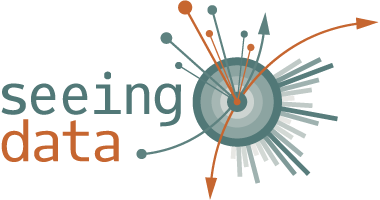Exciting New DataVis Research Collaboration in Norway
 In November I went to the kick-off meeting for a three-year research project called INDVIL (= Innovative Data Visualisation and Visual-Numeric Literacy) which is funded by the Norwegian Research Council and hosted at the University of Agder in Kristiansand, southern Norway.
In November I went to the kick-off meeting for a three-year research project called INDVIL (= Innovative Data Visualisation and Visual-Numeric Literacy) which is funded by the Norwegian Research Council and hosted at the University of Agder in Kristiansand, southern Norway.
INDVIL is led by Martin Engbretsen. Through theoretical and empirical studies, INDVIL will explore the extent to which data visualizations can be described as distinct texts and media types, their roles in social practices, and their potential in helping to address current challenges facing society. It involves a group of international researchers and partners from Norwegian society, such as Statistics Norway (SSB), The National Broadcaster (NRK) and selected schools.
INDVIL is made up of eight sub-projects, or Work Packages (WPs), as we call them. I’m working with Martin Engbretsen and Wibke Weber from Switzerland on a WP which looks at uses of data visualisation in the news in a range of European countries. This WP overlaps with the small-scale project ‘Innovative Datavis in the News’, funded by the Norwegian Media Authority, which you can link to from the menu on the left. Our WP investigates empirically how new tools for data visualization are used in newsrooms, and how users perceive, interpret and respond to datavis in the context of online journalism.
Other work packages cover a broad range of areas:
- Jill Walker Rettberg is looking at the kinds of knowledge and information can and cannot be expressed through datavis, the common genres of datavis, and examples of outliers and atypical datavis.
- Sara Brinch is looking at how metaphors are used in datavis and how different metaphors are interpreted by datavis-readers.
- Wibke Weber and Martin Engebretsen are looking at how dynamic and interactive datavis can be described, categorized and evaluated (as multimodal resources, aesthetic resources, technology-based artefacts).
- Mikael Snaprud is looking at the extent to which online datavis can be made accessible (for example conforming to the Web Content Accessibility Guidelines).
- Elise Seip Tønnessen is looking at the place of datavis and datavis literacy in school-based education in Norway.
- Torgeir Uberg Nœrland and Engebretsen are looking at the role that visualisation can play in deliberative democracy.
- A PhD student will also be funded as part of the project, the details of which are not yet confirmed.
Since starting work on Seeing Data we have become acutely aware that there is very little reflective, social science or humanities research into the role of data visualisations in culture and society and how to think about their simultaneous visual and numeric character. So you can imagine that it is fantastically exciting to work with a team of European scholars from a range of disciplines to think through some of these issues. Equally exciting is the prospect of linking our team on the PhD network ‘Relating to Data Through Visualisation’ (link on the left) to the INDVIL programme of research and finding ways to address shared concerns together. Watch this space for more details soon!
